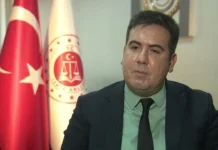In a landmark decision, Turkey’s Supreme Court of Appeals has overturned the conviction of a journalist who was the first in Turkey to be tried and sentenced under a controversial media law, the Turkish Minute news website reported, citing the Media and Law Association.
Journalist Sinan Aygül, editor-in-chief of Bitlis News and head of the Bitlis Journalists Association, was detained and kept in pre-trial detention for more than a week in late 2022 for allegedly spreading “disinformation” regarding a child abuse case in the predominantly Kurdish province of Bitlis in eastern Turkey.
He was the first journalist to be arrested and tried for “spreading disinformation” after tweeting about alleged sexual abuse that he later corrected and for which he apologized.
At the end of his trial in February 2023, Aygül was found guilty and sentenced to 10 months in prison. In its decision the court found that Aygül’s tweet constituted “disinformation” and was capable of “disrupting public peace.” The court also highlighted Aygül’s sizable online audience and the fact that the allegations of sexual abuse made it to the public debate in Turkey.
Aygül appealed his conviction at the Supreme Court of Appeals.
The top court’s 8th Criminal Chamber recently decided to overturn Aygül’s sentence on the grounds that the elements of the offense that led to Aygül’s conviction were not met and that he therefore should have been acquitted.
This is the first time that the top appeals court made a decision about a conviction based on Article 217/A of the Turkish Penal Code (TCK), which was added in October 2022, drawing widespread criticism for being a draconian measure targeting free speech and independent journalists.
The law, which criminalizes the dissemination of “false or misleading information” and stipulates prison sentences of between one and three years, was passed in parliament in October 2022.
Aygül, who commented about the overturning of his conviction on X on Friday, said the court’s decision has showed that the “totally absurd” law cannot be implemented despite efforts by the authorities. He described the development as “promising for freedom of speech and media freedom.”
However, he said the court’s decision does not change the fact that he was kept in pretrial detention for 10 days at a time when his two children were sick.
“Taking my ordeal into account, I don’t care if the Supreme Court of Appeals overturned by conviction or not. This is not justice,” the journalist tweeted.
Data from the MLSA and the Turkish Journalists’ Union (TGS) reveal that Article 217/A of the TCK has been frequently used against journalists since it went into effect. In the 18 months since the law was enacted, 47 investigations have been launched into 41 journalists due to their reporting, commentary or writing. Of those investigated, 10 journalists have been detained and four imprisoned, while 15 journalists face legal proceedings. Although 13 journalists have been acquitted, investigations against 18 others are ongoing.
Kurdish journalists in Turkey frequently face legal harassment, stand trial and are given jail sentences for covering issues related to Kurds and the outlawed Kurdistan Workers’ Party (PKK), which is listed as a terrorist organization by Turkey and its Western allies.
Rights groups routinely accuse Turkey of undermining media freedom by arresting journalists and shutting down critical media outlets, especially since President Recep Tayyip Erdoğan survived a failed coup in July 2016.
Turkey is one of the world’s biggest jailers of professional journalists and was ranked 158th among 180 countries in Reporters Without Borders’ (RSF) World Press Freedom Index published on May 3.















